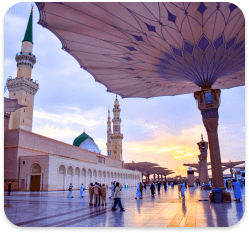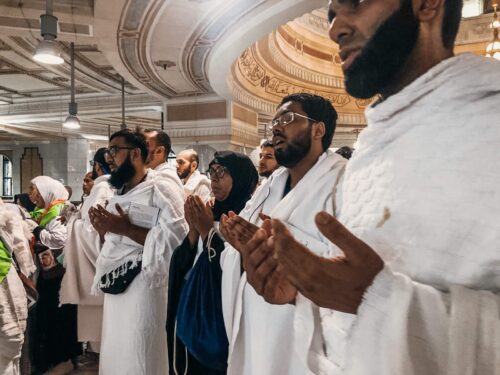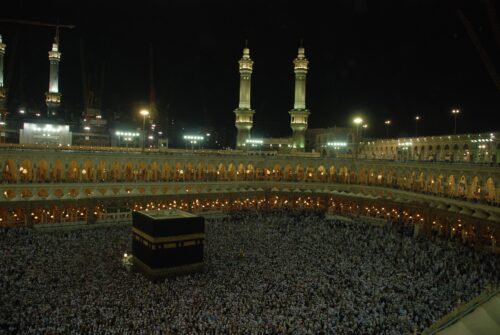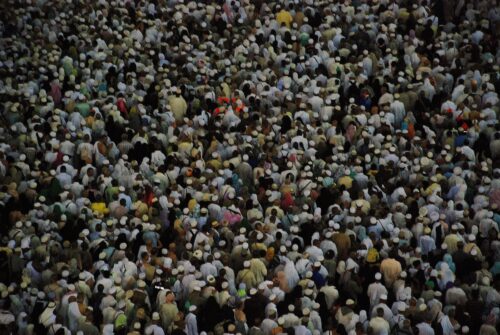What are the rewards for fasting in Islam? Religious, Health and Mental Benefits
Fasting is one of the purest forms of ibadat in refining the soul and making it deeply aware of Allah SWT. It teaches us to be faithful to Allah SWT. Fasting isn’t just a physical act limited to abstaining from food and drink; fasting of the eyes, ears, hands, tongue, and feet is strict self-regulation that fulfils one’s soul as well. Keep reading to learn about the rewards of fasting in Islam.
Spiritual Rewards
 Fasting isn’t just a form of Ibadat (worship) but rather a special investment that a person makes to seek the blessings of Allah SWT and have a fruitful afterlife. The spiritual rewards of fasting are as follows:
Fasting isn’t just a form of Ibadat (worship) but rather a special investment that a person makes to seek the blessings of Allah SWT and have a fruitful afterlife. The spiritual rewards of fasting are as follows:
Fasting Carries Unimaginable Rewards
Allah SWT has promised immense reward for every good deed in Islam. But what is that one benefit that a Muslim gains only from fasting?
The Prophet Muhammad (PBUH) said,’ Every action of the son of Adam is given manifold reward, each good deed receiving ten times it’s like, up to seven hundred times. Allah SWT the Most High said, “Except for fasting, for it is for Me, and I will give recompense for it, as he leaves off his desires and his food for me.” For the fasting person, there are two times of joy; a time when he breaks his fast and a time of joy when he meets his Lord, and the smell coming from the mouth of the fasting person is better with Allah SWT than the smell of musk.’ (Bukhari)
In light of the above-mentioned hadith, Islamic scholars have said that the reward of fasting is with Allah SWT Himself as a person is sacrificing all of their basic needs (worldly needs) for the sake of the Almighty for a reward in the afterlife.
Leads You into Jannah and Safeguards You from Hellfire
According to Islamic belief, this worldly life is temporary. Hence, our primary purpose should be to spend every day trying to become a better human being, and a better Muslim. Whether voluntary or obligatory, every fast pulls you closer to Ar-Rayyan (the gate of Jannah) and away from the Hellfire.
The Prophet Muhammad (PBUH) said, “Indeed, there is a gate of Paradise called Ar-Rayyan, through which only those who fasted will enter on the Day of Resurrection. No one else will enter it along with them. It will be said, ‘Where are those who fasted that they may enter?’ When the last of them enter, it will be closed, and no one else will go through it.” (Bukhari)
A single fast can take you far away from the burning flames of Hell. Now imagine fasting for a week or a month. How close will it bring you to Jannah, and how far it will take you from Hellfire? The Messenger (PBUH) of Allah SWT said, “A worshipper does not fast a day for the sake of Allah SWT except that that day (of fasting) distances the Fire from his face by seventy autumns.” (Tirmidhi)
“Prayer is the light of the believer, and fasting is his shield from the Hellfire.” (Ibn Majah)
Strengthens Your Belief in the Oneness of Allah SWT
“O you who believe! Fasting is prescribed for you, as it was prescribed for those who came before you, so that you may attain Taqwa (piety).” [Holy Quran, 2:183]
As per Islamic terminologies, Taqwa can be defined as being pious, conscious of the greatness of Allah SWT, and the fear of Allah SWT. Taqwa is the foundation of a Muslim’s belief and reminds us that one should do everything to please the Almighty and seek His blessings. Therefore, fasting increases Taqwa, meaning that one becomes more vigilant of their own life while constantly being conscious of the fact that Allah SWT is watching us. At the end of the day, fasting makes us better human beings as we are eager to seek out actions that please Allah SWT. Hence, they are less likely to fall into the trap of bad habits.
A man asked Abu Hurairah (RA) “What is Taqwa?” He replied, “Have you ever taken a thorny path?” The man said, “Yes.” Abu Hurairah (RA) asked, “What did you do?” The man answered, “If I saw the thorns, I would avoid them, pass over them, or stop short of them.” To this Abu Hurairah (RA) said, “That is Taqwa.” (Bayhaqi)
Health Benefits
A person’s soul and body are Amanah (trust) from Allah SWT, and so we should do everything to nourish it and protect it from harm. The act of fasting helps you take care of your body by adopting a healthier lifestyle. Muslims are recommended to fast not only in the month of Ramadan but throughout the year while remembering that we fast for the pleasure of Allah SWT because it’s good for us. Here are some health benefits of fasting:
Boosts Metabolism
One of the most prominent benefits of fasting is that it helps alleviate obesity and boosts metabolism. When a person fasts, their liver enzymes break down fats and cholesterol to turn them into bile acid, which converts into heat and stimulates a more efficient metabolism. Furthermore, fasting naturally suppresses the hunger hormone level in your body, resulting in you feeling full even after eating a small portion.
Healthier Brain and Cognitive Functioning
Fasting is like exercise for your brain. During the fasting period, a person’s body is filled with endorphins which gives them a feeling of well-being and promotes great mental health. It also leads to the production of restorative tissue, which slows down the ageing process and makes you feel good about yourself.
Strengthens the Immune System
 Did you know that fasting supports muscle growth? Basically, your immune system comprises white blood cells. Therefore, when a person fasts, the body automatically starts recycling old white blood cells, resulting in a more robust immune system. Throughout the duration of fasting, your body starts regenerating stem cells that consist of red blood cells, platelets, and white blood cells until you consume food again.
Did you know that fasting supports muscle growth? Basically, your immune system comprises white blood cells. Therefore, when a person fasts, the body automatically starts recycling old white blood cells, resulting in a more robust immune system. Throughout the duration of fasting, your body starts regenerating stem cells that consist of red blood cells, platelets, and white blood cells until you consume food again.
Mental Rewards
Fasting doesn’t only help improve your physical and spiritual health, but it also brings you mental peace while allowing you to regain control of your life and redefine your relationship with food. The meals we eat every day account for one of the greatest blessings of Allah SWT.
“And it is He Who causes gardens to grow, trellised and untrellised, and palm trees and crops of different (kinds of) food, and olives and pomegranates, similar and dissimilar. Eat of (each of) its fruit when it yields and give its due (Zakat) on the day of its harvest. And be not excessive. Indeed, He does not like those who commit excess.” [Holy Quran, 6:141]
Food provides us with nutrition and gives us the strength to perform daily activities. From the pleasure of the inviting aroma to the joy of sharing meals to the delicious taste, a person’s relationship with food is so potent that most of us have even associated special meals for the Holy month of Ramadan. The emotional rewards of fasting are as follows:
Helps You Redefine Your Relationship with Food
Even though ideally, a person’s day should be structured around the time of prayers, it is easier to break up our days in terms of food. However, when a person fasts, they stop planning their day around meals and satisfying every unhealthy craving. Instead, they start focusing on pleasing Allah SWT, eating clean and healthy, living the Islamic way, showing gratitude to Allah SWT, and preparing for the afterlife.
Reminds You That Food Is a Necessity
Food is a necessity and the ultimate source for survival. People across the world are working day and night to earn their daily bread. The holy act of fasting reminds us that no matter how scrumptious a biscuit might be, a person ultimately “eats to live” rather than “lives to eat.” Simply put, fasting teaches one that food is only a necessity and that one should be grateful to Allah SWT for taking care of our basic needs and providing us with enough food on the table.
Allah SWT’s Messenger (PBUH) said, “Allah SWT tests His servants by giving to him. Whoever is content with what Allah SWT has apportioned for him, Allah SWT will bless him in it and expand it. Whoever is not content, he will not be blessed in it.” (Ahmad)
Teaches Us How to Listen to Our Bodies
A person’s appetite is usually much smaller than what they perceive it to be. Therefore, when you fast, despite starving all day, you are only able to eat a small portion of food. Even the beloved Prophet Muhammad (PBUH) guided his companions to eat food at a slow pace and to chew properly as it takes a while for the stomach to signal the brain that you are full. Fasting teaches you how to listen to your body again, reset portion sizes, and understand when you are actually full.
Prophet Muhammad (PBUH) said, “A human being fills no worse vessel than his stomach. It is sufficient for a human being to eat a few mouthfuls to keep his spine straight. But if he must (fill it), then one-third of food, one-third of drink, and one-third of air.” (Ibn Majah)
What Is the Reward for Feeding a Fasting Person in Islam?
If you aren’t fasting yourself, another great way to earn the reward is by providing iftar to the one who is fasting, Prophet Muhammad (PBUH) said, “Whoever feeds a person breaking his fast will earn the same reward as him, without anything being lessened from the reward of the fasting person.” (Tirmidhi)
What Did Prophet Muhammad (PBUH) Say about Fasting?
Fasting is one of the five pillars of Islam. Prophet Muhammad (PBUH) has directed his Ummah to practise fast, especially in the month of Ramadan. Some hadith regarding the significance of fasting are as follows:
Hadiths of the Rewards of Fasting
Prophet Muhammad (PBUH) said, “Fasting is a shield with which a servant protects himself from the Fire.” (Sahih)
 In another instance, Prophet Muhammad (PBUH), while stating the significant rewards of fasting, said, “Every action of the son of Adam is given manifold reward, each good deed receiving then times it’s like, up to seven hundred times. Allah SWT the Most High said, ‘Except for fasting, for it is for Me, and I will give recompense for it, he leaves off his desires and his food for Me.’ For the fasting person, there are two times of joy; a time when he breaks his fast and a time of joy when he meets his Lord, and the smell coming from the mouth of the fasting person is better with Allah SWT than the smell of musk.” (Al-Bukhari)
In another instance, Prophet Muhammad (PBUH), while stating the significant rewards of fasting, said, “Every action of the son of Adam is given manifold reward, each good deed receiving then times it’s like, up to seven hundred times. Allah SWT the Most High said, ‘Except for fasting, for it is for Me, and I will give recompense for it, he leaves off his desires and his food for Me.’ For the fasting person, there are two times of joy; a time when he breaks his fast and a time of joy when he meets his Lord, and the smell coming from the mouth of the fasting person is better with Allah SWT than the smell of musk.” (Al-Bukhari)
Ibn Khuzaymah (RA) reported that Prophet Muhammad (PBUH) said, “Indeed there is a gate of Paradise called Ar-Rayyan. On the day of Resurrection, those who fast will enter through it; no one enters it except for them, and when they have entered, it is closed so that no one enters it, so when the last of them enters it, it is closed, and whoever enters it drinks, and whoever drinks never becomes thirsty.” (Sahih)
The Messenger (PBUH) of Allah SWT while highlighting the reward of fasting said, “He who fasts Ramadan, due to Iman and hoping for reward (from Allah SWT) then his past sins are forgiven.” (Al-Bukhari and Muslim)
The beloved Prophet Muhammad (PBUH) said, “You should fast because fasting is a shield to save oneself from hell and save oneself from the difficulties of the time.”
Rewards for Fasting During Ramadan
Ramadan is one of the most sacred months in Islam. Every Ramadan, let’s take out the time to appreciate fasting and the rewards that Allah SWT promises. Just remember that every second that a person fasts will bring them closer to Allah SWT. Therefore, spend the month repenting for your sins and seeking the blessings and forgiveness of the Creator.
“There are in the month of Ramadan in every day and night those to whom Allah SWT grants freedom from the Fire, and there is for every Muslim a supplication which he can make and will be granted.” (Al-Bazzar and Ahmad. Sahih)
Ibn Hibban (RA) narrated, “There are in the month of Ramadan in every day and night those to whom Allah SWT grants freedom from the Fire, and there is for every Muslim a supplication which he can make and will be granted.”
A man came to the Prophet Muhammad (PBUH) and asked, “O Messenger (PBUH) of Allah SWT, what if I testify that none has the right to worshipped but Allah SWT and that you are the Messenger (PBUH) of Allah SWT, and I observe the five daily prayers, and I pay the zakah, and I fast and stand in prayer in Ramadan, then amongst whom shall I be?” The Prophet (PBUH) said: “Amongst the true followers of the prophets and the martyrs.” (Sahih)
The beloved Messenger (PBUH) of Allah SWT stated, “Whoever fasts the month of Ramadan out of faith and in the hope of earning reward, all his previous sins will be forgiven, and whoever stays up during Laylat al-Qadr out of faith and in the hope of earning reward, all his previous sins will be forgiven.” (Agreed upon).”There are in the month of Ramadan in every day and night those to whom Allah SWT grants freedom from the Fire, and there is for every Muslim a supplication which he can make and will be granted.”
Summary – Rewards of fasting
Whether you are observing a fast in Ramadan or fasting voluntarily, fasting carries immense rewards. It improves our relationship with our body and food, teaches us to be more conscious and grateful to Allah SWT, and protects us from the Hellfire. During Ramadan, let’s try to improve our relationship with Allah SWT, and increase our voluntary fasts by observing fast in the month of Shaban that leads up to it, not forgetting Mondays and Thursdays, and the Three Bright Days every month.
Explore this site and hundreds more from the three holy sites on IslamicLandmarks.com








